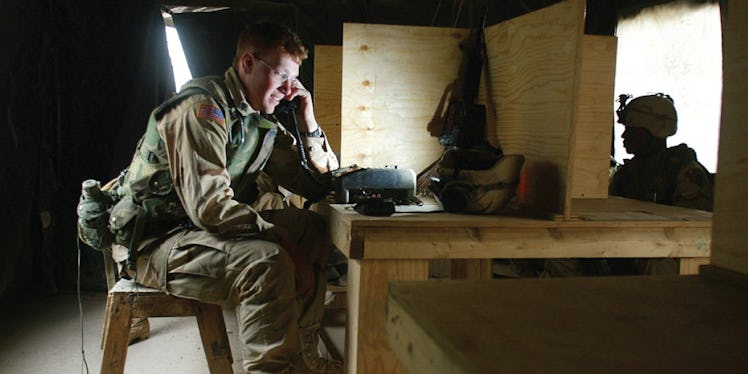How To Stay Connected With Your Kids, From Business Trips To Deployment
What your family should know before you gotta go.

When kids are apart from a parent, it’s rough on everyone. For some families, it’s a week-long business trip to Minneapolis. Others it’s months on an oil rig. And for the more than 2 million families of the military and National Guard, it’s a year-long deployment overseas. That requires a unique level of parental fortitude, but there are things the moms and dads in the armed forces can teach any parent who needs to be away from the kids for a bit.
Bana Miller is the Communications Director of Blue Star Families, an organization that provides resources and info to military families. She’s also a mother of 3 and her husband has been on active duty for their entire 12-year marriage — so she’s basically a 5-star general of deployment coping management. Miller has a bunch of military-grade tips on how to stay connected to your kid and mitigate their anxiety when you can’t physically be there for them.
Prepare The Family
Depending on how old your kid is, they might not really understand what’s going on. Help them prepare by spending quality time as a family. For military parents, this is usually block leave the week before deployment. For business parents, you can just block out the weekend before you take off and make sure there’s there’s one-on-one time together. It can be just hanging out and watching Paw Patrol, or doing some special activity that you both enjoy.
Miller also recommends reading books or watching shows that talk about leaving. Even Daniel Tiger knows “grown-ups come back.” “I have 3 kids under 4, and I’ve found reading stories helps them grasp the hard concepts,” she says. Just keep it kid-appropriate. Your 3-year-old isn’t ready for All Quiet On The Western Front.
Get Everyone Synchronized
Kids can’t grasp the concept of leaving the playground in 5 minutes, so telling them dad will be gone for a year is not something they can internalize. Long stint or short trips, Miller says setting up countdown rituals can help. Some ideas include adding to a candy jar every day (or, because kids like candy, subtracting). Or you can make a paper chain where they remove a link weekly for a long deployments, or daily to understand when you’re coming back from that conference in Miami. Also, you can help them understand time differences by setting up a command station with one clock for the household and one for the other parent’s time zone. Hey kids, it’s tomorrow in Guam!
Leave A Little Bit Of Yourself Behind
You can’t be there to cuddle or give them a hug, but a plush version of you can. There’s a company called Daddy Dolls that takes photos of service members and makes them into a doll for their kid. “It’s kind of like Flat Stanley. That way the parent can still be in pictures and at milestone events,” Miller explains. “Anything physical or tactile that they can hold onto is great.” If you’re afraid your family is going to start using that doll like a voodoo pincushion, you can record their favorite bedtime stories. Or, if you kids would rather listen to Bryan Cranston read an audiobook, get one of Toymail’s Talkies to send your kid messages via stuffed animal.
We Have The Technology
It’s easy enough to use the Wi-Fi at your Holiday Inn Express to FaceTime the family for dinner, but for those locked into the schedule of active duty, it’s more difficult. Miller says everyone should be able to find a regular time each week to check in. “It’s such a great tool to feel like they’re part of the day-to-day routine of being home.”
One thing that your kids can learn from families with a parent on deployment, it’s that they learn to roll with things. She says if you can’t connect one evening, don’t make a big deal out of it. “If military families have one thing in common, it’s flexibility,” says Miller. “The parent at home can say, ‘OK, looks like the computer’s not working today, we’ll try again next time.’ And that’s where having those recorded story books or something a child can play on their own time is great.”
Care Packages Work Both Ways
“The care package has been around for as long as we’ve been deploying soldiers, and it’s great for the family and home to have that ritual of putting it together,” says Miller. Even if you’re not serving, but are just going to be gone for an extended period, make sure you have the hotel address. Remember, it doesn’t just have to be loaded up with treats (although nobody ever turned down a Rice Krispie Treat). The box gives kids the opportunity to share letters and pictures, and write back on the same note. Try taking turns writing pages in a shared journal. It will teach your kid what communication was like before emojis.
Build Your Support Team
Miller says service members rely on the community for support, and you should too. Let teachers, coaches, and any other important adult in your kid’s life know that they need to communicate with both parents. It’s 2016, so schools now use electronic mail; all it takes to keep you in the loop is a CC. “For the child too, knowing that while their parent may not be able to do in-person parent-teacher conferences there’s still communication, can be fantastic reassurance,” says Miller. Although contributing to the bake sale may be a bridge too far.
This article was originally published on